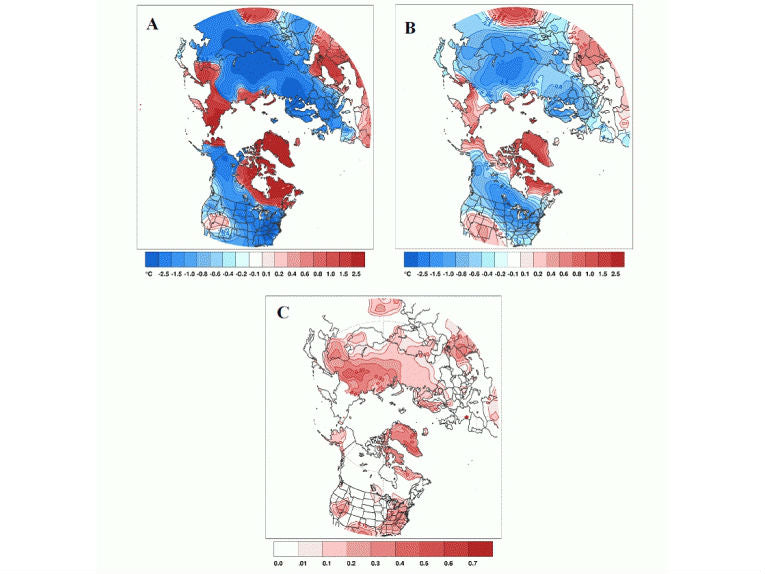Environmental Research Letters is publishing new insights into the last two decades' weather. Global warming is producing warmer autumns that cause colder winters. People obviously find that difficult to understand. The charts above are explained in the article below:
As has been noted, eastern US, southern Canada and northern Eurasia have had winters that can't be easily explained as natural variability. In the Arctic, strong warming throughout July, August and September melted more sea ice than was previously lost in this way. The humidity of the Arctic atmosphere increased with this, and caused precipitation over Eurasia. This fell as snow because of the freezing temperatures of the early winter. The effects of snow cover are intricately woven into the "Arctic Oscillation" (this is a pressure pattern in the mid to high latitudes). Basically, a negative effect arose, in which high pressure becomes dominant over the Arctic, pushing cold air south.
However there is hope for the non sledge fraternity. Judah Cohen is the lead author of this new research: "In my mind there is no doubt that the globe is getting warmer and this will favour warmer temperatures in all seasons and in all locations; however, I do think that the increasing trend in snow cover has led to regional cooling, as discussed in the paper, and I see no reason why this won't continue into the near future. Also if it continues to get much warmer in the fall, precipitation that currently falls as snow will fall as rain instead, eliminating the winter cooling." With Jason C. Furtado and Vladimir A. Alexeev , Mathew A Harlow and Jessica E. Cherry he has produced evidence to confound the doubters who assume global warming can't account for colder winter weather. Climate models have consistently failed to predict this snow because apparently they don't take account of snow-cover variability.
With major industrial centres affected by this unseasonally early snow, these extremes should be forecast as accurately as possible. Traditional global warming theory would suggest winter warming trends, but several regions such as those we deal with here have a negative trend in temperature over the last 25 years.
The predictions of the team for the 2009/10 winter and even more so for the winter of 2010/2011 were successful when compared to forecasts which took no account of observed snow cover. In particular, no other seasonal forecast got the cold winter of 2010/2011 correct! So watch out next year, despite the relatively warm January we have had so far in 2012.










